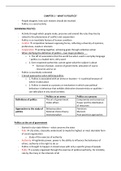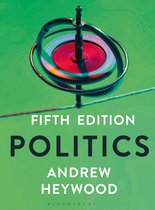CHAPTER 1 – WHAT IS POLITICS?
- People disagree, how such matters should be resolved
- Politics is a social activity
DEFNINING POLITICS
- Activity through which people make, preserve and amend the rules they live by
- Linked to the phenomena of conflict and cooperation
- Politics is an inevitable feature of human condition
- Conflict → competition between opposing forces, reflecting a diversity of opinions,
preferences, needs or interests
- Cooperation → working together, achieving goals through collective action
- When clarifying the definition of politics – two major problems
o 1. The off of associations that the world has when used in everyday language
– politics is a loaded term, dirty word
o 2. Even respected authorities cannot agree what the subject is about
▪ Exercise of power, science of government, allocation of scarce
resources and so on
- Politics is essentially contested
- 2 broad approaches when defining politics
o 1. Politics is associated with an arena or location – it is political because of
where it takes place
o 2. Politics is viewed as a process or mechanism in which case political
behaviour is behaviour that exhibits distinctive characteristics or qualities –
can take place in any social contexts
Politics as an arena Politics as a process
Definitions of politics The art of government Compromise and consensus
Public affairs Power and the distribution
of resources
Approaches to the study of Behaviouralism Feminism
politics Rational-choice theory Marxism
Institutionalism Post-positivist approaches
Politics as the art of government
- Started in city-state Athens – what concerns the state
- Polis → city-state, classically understood to imply the highest or most desirable form
of social organization
o Study of the exercise of authority
- Authority → legitimate power, power is the ability to influence the behaviour of
others, authority is the right to do so
- Politics is thought to happen in closed areas with only a specific group of people
- Polity → a society organized through the exercise of political authority, for Aristotle,
rule by the many in the interests of all
, - Negative view of politics – it is closely associated with the activities of politicians
o View as self-serving, two-faced and unprincipled activity, evident in the use of
derogatory phrases such as ‘office politics and ‘politicking’
- Anti-politics → disillusionment with formal or established political processes,
reflected in non-participation, support for anti-system parties or the use of direct
action
- Niccolò Machiavelli
o Italian politician and author
o Public affairs
o The Prince
o Machiavellian = cunning, duplicitous
- Negative view of politics reflects the liberal perception that individuals are self-
interested and political power is corrupting as it encourages those in power to exploit
their position
- Task of politics is to ensure that it is conducted within a framework of checks and
constraints that guarantee governmental power is not abused
- Power → the ability to achieve a desired outcome, ‘power to’ do something
Politics as public affairs
- Beyond the realm of government, public life/affairs
- Aristotle – man is by nature a political animal
- Where should be the line between public and private life
- Aristotle
o Greek philosopher, student of Plato, tutor of Alexander the Great
o Peripatetic school
o Foundation for Islamic and Christian theology
o Book – Politics
- Civil society → political community, distinguished from the state, institutions that are
private (independent from the government) and organized by individuals to pursuit
their own ends
- The notion that politics should exclude ‘personal’ was challenged by feminists –
gender inequality has been preserved because the inequal division of labour was
seen as natural rather than political
Public Private
The state: Civil society:
apparatus of government Autonomous bodies – businesses, trade
unions, clubs, families…
Public realm: Personal realm:
Politics, commerce, work, art, culture… Family and domestic life
- Politics as public activity – both positive and negative
o Positive – because of public character, Rousseau and Mill
▪ Public affairs is educational
o Negative – politics as unwanted interference, private life should not be
interfered






